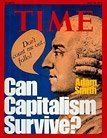Tuesday, June 09, 2009
Why DID Carter lose?
What was most striking to me was the quote Kling stuck in his post, from Rich Lowry:
despite all of his incredible political skills, [Ronald Reagan] wouldn't have won election if it weren't for inflation, if it weren't for gas lines, if it weren't for the reigning hostage crisis, if it weren't for Afghanistan, if it weren't for the entire litany of Carter administration failures. And when you are as far as Republicans were in the late 1970s, and as far down as they are today, you need the other side to fumble, and for its vision to be discredited. And at the moment, Barack Obama has the ball, and he is going to have the ball until he commits some sort of turnover.I was a first-
 year grad student in the spring of 1980, and I had to go back and check, but Carter was down to Reagan by the end of the primaries by a fair amount, and this had to do primarily with his handling of the economy. Reagan slid in the summer and early fall. He hadn't done a very good job in the early campaign. The hostage crisis had not even moved to the stage of the abortive rescue attempt. Reagan of course won by more than most people expected (it even lead to questions about polling -- guess they've been around for a long time!) The attacks on Reagan were the Goldwater strategy (without Daisy) and the snobbish appeal that he was an actor, a lightweight.
year grad student in the spring of 1980, and I had to go back and check, but Carter was down to Reagan by the end of the primaries by a fair amount, and this had to do primarily with his handling of the economy. Reagan slid in the summer and early fall. He hadn't done a very good job in the early campaign. The hostage crisis had not even moved to the stage of the abortive rescue attempt. Reagan of course won by more than most people expected (it even lead to questions about polling -- guess they've been around for a long time!) The attacks on Reagan were the Goldwater strategy (without Daisy) and the snobbish appeal that he was an actor, a lightweight.Michael Barone a few years ago remembered what had pushed people towards Reagan:
Those of us who remember the 1980 campaign sometimes forget how dire things seemed as we entered that election year. Busch begins his narrative with an account of Jimmy Carter's July 15, 1979 "malaise" speech (which, as he notes, never included that infamous word), and quickly sketches how we'd come to that point. He reminds us that in the 1970s, Time magazine featured cover stories like "Can Capitalism Survive?" Keynesian economics, which had promised us endless low-inflation economic growth, had in fact produced high-inflation economic stagnation�"stagflation," as it came to be called.My professors at the time (except for the fellow that taught second-semester macro, who seemed impervious to the times) offered pieces on post-Keynesianism, incomes policies, and all manner of early third-way economics. None of it, we thought, seemed to work.
There are many times in life, though, where things that don't seem to work nonetheless dazzle us, bring us some good emotions that we consume. Indiana Gov. Mitch Daniels says later that voting Obama was a "luxury purchase" and a "fashion statement." We live in a country that can afford a few foolish purchases (yes, even now). But frugality almost always follows frivolity because to continue in extravagance is disastrous. Carter was, as Obama is in Daniels' estimation, "the natural desire for change after a period of poor results", but the results so far are like a rebound romance. Eventually one moves on.
Labels: Carter, economics, elections, Reagan









